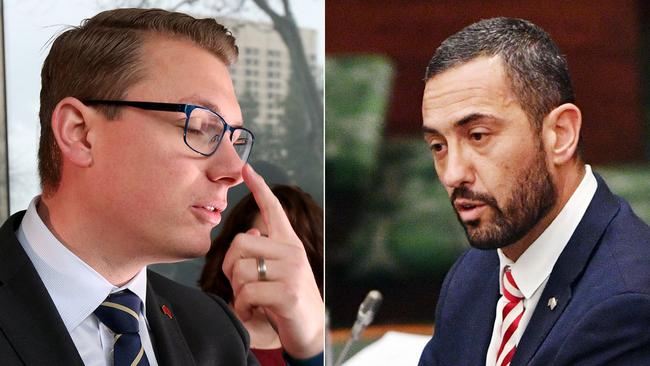ICAC refuses to provide any details of a possible investigation into Renewal SA, after two executives stepped away
SOUTH Australia’s anti-corruption watchdog has refused to provide any details of a possible investigation into a public sector agency that handles hundreds of millions of dollars in developments, after two executives took indefinite leave.
SOUTH Australia’s anti-corruption watchdog has refused to provide any details of a possible investigation into a public sector agency that handles hundreds of millions of dollars in developments, after two executives took indefinite leave.
The Advertiser on Tuesday revealed two top bureaucrats in Renewal SA, which handles building projects including the Riverbank and old Royal Adelaide Hospital site, had stepped away in conditions shrouded by secrecy. A day of high political drama yesterday ended with ICAC boss Bruce Lander issuing a statement which implies he is probing the matter.
Since news of the executive departures was broken, The Advertiser has been barred from publishing further key information under state laws that now restrict making the executives’ identities public.
Transport Minister Stephan Knoll faced intense scrutiny during a heated Budget Estimates hearing yesterday morning, as Opposition spokesman Tom Koutsantonis demanded to know if State Government offices had been raided and material including phones and computers were seized.
Mr Knoll responded: “That is a question that the member knows I cannot answer” and he made repeated references to a written statement released on Tuesday that confirmed the two executives were on leave.
Other elements of the questioning could not be reported, on legal advice, despite having been said under Parliamentary privilege and broadcast live on the internet by a taxpayer-funded video service.

The situation led Attorney-General Vickie Chapman to issue a statement at 2.17pm saying she had contacted the Independent Commissioner Against Corruption about Renewal SA.
Ms Chapman said she inquired if Mr Lander had “any further information that can be made available on this matter” and had been told “there is not”.
She said Mr Lander “at this stage will not be making a public statement on the matter”.
However, that position changed within three hours and Mr Lander released a public statement that confirmed the media could publish Ms Chapman’s statement.
He said “I do not intend to make any further statement in respect of that matter at this time”, before giving a lengthy explanation of why he was not inclined to make details of any corruption inquiries public.
Mr Lander said only once had he previously identified someone who was being investigated for corruption but had not been formally charged.
“That public statement was made at the request of the person (who was) the subject of the investigation and after the investigation had concluded,” Mr Lander wrote. “Otherwise, I have not previously identified ... the subject of an investigation during the course of an investigation until after the person has been charged.”
Mr Lander said the laws which established his agency in 2012 were “designed in such a way that a person (who is) the subject of a corruption investigation ought not suffer reputational harm until such time the person is charged”.
“The very purpose of an investigation is to collect evidence,” he wrote. “The fact of an investigation is not proof that corruption has occurred.
“Corruption investigations must be conducted in private. I think that is appropriate.
“If I were to make a further statement in respect of this matter there would be an expectation that I would do so in respect of all matters that I might be investigating.
“That would be inconsistent with the legislation under which I operate. For that reason I will not make any further statement at this time.”
A furious Mr Koutsantonis yesterday said Parliamentary privilege allowed Mr Knoll to reveal the identity of executives on leave and the reasons surrounding the departure.
“If police or law enforcement officers attend a government building, raiding an office using search warrants, do you think it is not the business of this Parliament to know?” Mr Koutsantonis said. “This is the Parliament.
“You can say whatever you like, and the people of SA deserve an answer.”
The ICAC has previously investigated Renewal SA for maladministration, not corruption, over the ill-fated Gillman land deal, and made findings against executives. State Parliament is considering whether to change ICAC laws to permit open maladministration hearings. Corruption investigations, those that could result in criminal charges, would stay secret.
All parties in Parliament say they support giving Mr Lander the power to hold open maladministration hearings. However, there will also be consideration of making other changes to ICAC laws.
